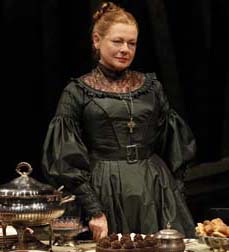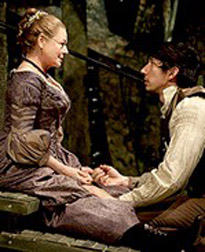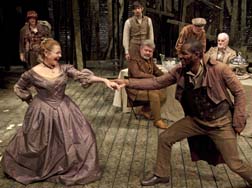A table is set with bread and cakes, back-dropped by a forest created from a jumble of cross-hatched planks painted and splotched to suggest leaves. (Sets by Santo Loquasto.) A servant is angry at the housekeeper who enters the space without warning. Do we barge in on you? Class stratification and conflicts ripple through this richly comic production of Alexander Ostrovsky’s satire of a Russian aristocracy high on self-importance and low on cash.
The play at the Classic Stage, expert in staging old dramas with modern inflections, is given a lively production by Brian Kulick who, with a new adaptation by Kathleen Tolan, makes it seem quite current in spirit. After all, class snobbery and hypocrisy haven’t changed much. If you haven’t seen an Ostrovsky play, go to this one.

Plays about Russian aristocrats immediately conjure up Chekhov, and there’s a lot in this play that reminds one of The Cherry Orchard. Raisa, (a fulsome Dianne Wiest), a widow in her fifties who owns the estate, has been having a good time in the big city, but returns to take care of business, which includes selling off some of the forest to pay expenses. Chekhov, who completed his play in 1903, showed his female estate owner, also selling off trees to support her lifestyle, as spoiled, but not ridiculous. Not so Ostrovsky in 1870.
Ostrovsky’s nobles, Raisa as well as her friends Milonov (Herb Foster) and Bodaev (George Morfogen) fall all over each other proclaiming how generous they are to the peasants. Do I live only for myself, gentlemen? All that I have belongs to the poor, she declares. I keep it safe for them, I am only a clerk. The poor and wretched of this world are the true owners.
Minonov wishes they could go back to the time of severity in treatment, yes, but love in our souls. West, Foster and Morfogen (in a top hat) are hypocrites who really believe the nonsense they spout. The actors present just the right mix of seriousness and absurdity.

The most useless aristocrat is Aleksei (an appropriately clueless Adam Driver) who, having failed at school, has been invited for the summer to court Raisa’s young niece, Aksyusha (Lisa Joyce). She, the compleat ingénue, is in love with the merchant’s son, Pyotr (Quincy Dunn-Baker). But the merchant, Vosmibratov (Sam Tsoutsouvas), ever counting his kopeks, won’t let his son marry without a dowry, and Raisa won’t give the cash for anyone but Aleksei.
So, here, symbolically, is the challenge posed by the new economic class that exerts the power of self-made money against old-line status. Raisa is selling her forest piecemeal to the merchant, so we know who will win eventually. And for the moment, both cash and status seem to trump love.
Ostrovsky, quite ahead of his time, also directs some jabs at egregious male chauvinism. Bodaev tells Raisa, Please don‘t take offense, but the fact is so many of our fine estates have been ruined by women. If a man squanders his money, nevertheless there is some sense to his extravagance, but in a woman, the stupidity knows no bounds. Vosmibratov the merchant agrees: Nothing good comes from giving womenfolk their freedom.
However, Raisa seems quite modern, or perhaps timeless, when she makes a play for Aleksei, who, fool that he is, doesn’t figure out what is happening.

The best part of the play is when Ostrovsky speaks through two itinerant actors who remind one of Shakespeare’s buffoons. The tragedian, Gennady (an exuberant and commanding John Douglass Thompson), is Raisa’s late husband‘s nephew, once in the military, now gone for 15 years, but keeping in touch by sending her presents from all over Russia. His foil is the comedian Arkady (Tony Torn).
Gennady is a theatrical charmer and ultimately the truth teller of the story, which he expounds with dialogue from Schiller‘s play “The Robbers.” At the end, you’ll ask why we don’t see more of Ostrovsky. Fortunately, there’s the Classic Stage to make sure he’s not forgotten.
The Forest. Written by Alexander Ostrovsky; adapted by Kathleen Tolan; directed by Brian Kulick. Classic Stage, 136 East 13th Street, New York City. 212-352-3101. jttp://www.classicstage.org/. Opened May 6, 2010; closes May 30, 2010.

